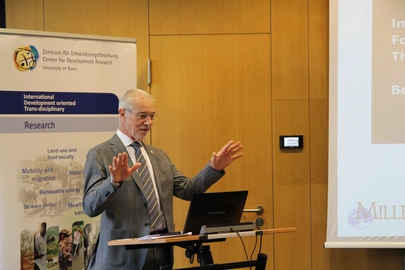Right Livelihood Laureate Hans Herren talked at ZEF about transforming agriculture and food systems
June 01, 2015.
Today, June 1, 2015, "Alternative Nobel" Prize winner Hans Herren gave a talk on <link fileadmin downloads herren_final_rlc_bonn_june_2015.pdf file>Transforming agriculture: Why, how, who, when. He emphasized the need for changing global food systems and that it is time to put ideas into action.
In his talk he emphasized that "business as usual" - meaning agricultural business focusing on intensifying and increasing production only - will not suffice for providing sustainable food and nutrition security for all people on the planet in the long run.
He explained that what most people do not know: the way smallholder farmers produce food is not only sustainable but also extremely productive: Smallholder farmers produce more food per hectare than traditional farmers who have to use pesticides etc. for large-scale agricultural production sites. Besides, smallholder farmers tend to produce a larger variety of food as well as more vegetables and fruits. This is ecologically more sustainable for soils and offers a more diverse consumption pattern for humans. Moreover, consuming less meat means using less water, emitting less CO2 emissions and providing more food for all the people on the planet.
One question from the audience related to what we can actually do to generate a shift in policy-making and production methods towards more sustainability. Herren puts his hope into the young and upcoming generation of academics and activists. "Maybe we all have to take to the streets. We need more public pressure to achieve change", he said during his discussion with the mainly young audience.
Dr. <link http: www.millenniuminstitute.net about hans.html external link in new>Hans R. Herren is Right Livelihood Award (“Alternative Nobel Prize”) Laureate 2013, President of the Millennium Institute (Washington DC), President of Biovision Foundation (Zurich), “World Food Prize” Laureate 1995. He is a guest of the <link http: www.rlc-bonn.de external link in new>Right Livelihood College (RLC) Campus Bonn, based at ZEF, which is holding an international workshop "Food security and sustainable agriculture; The future of smallholder farmers?" at ZEF in Bonn from May 30 to June 4, 2015.
The RLC workshop is attended by around 30 doctoral students from all over the world, who will engage with Hans Herren on the topic of sustainable agriculture and smallholder farmers. The workshop is supported by the <link http: www.daad.de external link in new>German Academic Exchange Service (DAAD) and the <link http: www.bosch-stiftung.de content language2 html index.asp external link in new>Robert Bosch Foundation.
----------------
Hans Herren also spoke at a <link http: www.zef.de external link in new>panel discussion Monday, June 1, 6:00 p.m. in the Old Town Hall of Bonn. Around 130 people attended the lively debate about risks and opportunities of organic and sustainable agriculture in contrast to more "conventional" agricultural methods which imply the use of pesticides for increasing yields. According to Hans Herren it is crucial to adapt pricing policies for agricultural products - as long as consumers in the Global North only have to pay up to 7% of their income for food and people in the South up to 70% something is wrong in the food system, he claimed. Especially as most small-scale food producers are also the ones being hungry. "Smallholder farmers should be on board when governments talk with private companies brokering deals - they should be part of the planning process", he endorsed.
Co-panelist Stephan Krall (GIZ) countered by saying that the story is not that black and white. He told about his experience in Peru, where herbicides were used by smallholder farmers to boost their agricultural production and therewith sustain their livelihoods. "Why not use the means that are available?" he asked, "when it helps to fight poverty and hunger".
Co-panelist Timo Beiermann (FIAN) related on his experiences in, amongst others, Indonesia. He had the following main messages:
- Conflicts over land will increase if the commercialization of agriculture in the Global South expands. This will generate even more migration and aggravate food insecurity.
- It is important to support smallholder farming and cooperatives, especially to achieve local food security and create mixed systems such as diversified agro- forestry. The latter mitigates dependencies on the world market, in particular among less developed countries.
- People and the right for food should always prevail over profit-maximized intensive agriculture.
- If you follow the logic of business and investment alone, one neglects and underestimates the impact of the degradation and exploitation of land and natural resources such as soils and water on human society.
----------------
Videos:
- Hans Herren was also interviewed by <link http: www.digital-development-debates.org issue-15-responsibility--common-responsibility--the-real-costs-of-cheap-food.html external-link-new-window external link in new>Digital Development Debates. You can watch <link https: youtu.be external-link-new-window external link in new>the interview on our youtube-channel.
- <link https: www.youtube.com external-link-new-window external link in new>Panel Discussion on "Who will feed the world?"


